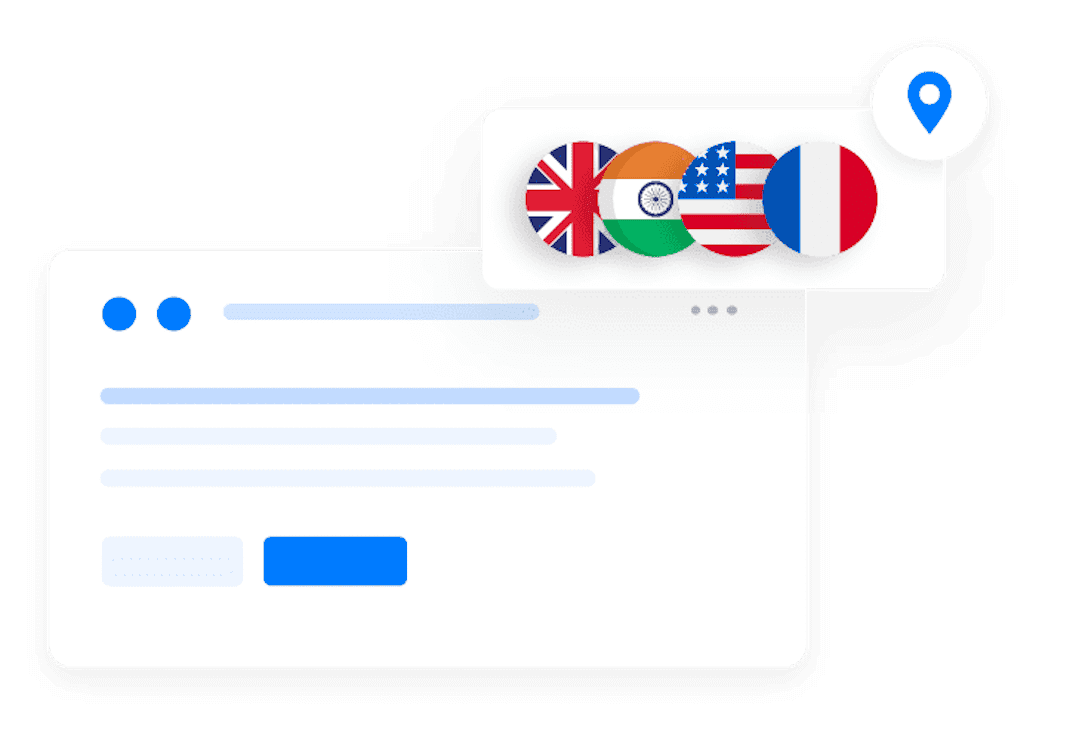
Trusted International SEO Consultant for Global Growth
As an International SEO consultant, I specialize in helping businesses like yours expand their reach and drive targeted traffic from global markets. I create SEO strategies tailored to both local and international audiences, ensuring your website ranks effectively across different regions. By leveraging advanced keyword research, multilingual optimization, and region-specific tactics, I help businesses enhance their online visibility and improve conversions worldwide.
If you’re looking to grow your brand in new markets or optimize your global digital presence, I’ll help you develop a customized SEO plan that delivers tangible results. Let’s take your business to new heights internationally.
International SEO Consultant Services
As your expert International SEO Consultant, I provide comprehensive services to help your business rank globally and drive qualified traffic across languages and countries.
In-Market Keyword Research & Localization
I conduct native-language keyword research tailored to each market, analyzing search habits, regional volumes, and competition to optimize content for local intent and drive conversions.
Global Technical SEO & Site Architecture
I implement hreflang tags, geo-targeting, and optimal URL structures (ccTLDs, subdomains, subdirectories) to ensure your site is technically optimized for international search engines, with fast mobile-first performance.
Site Structure Strategy
I advise on scalable international site structures aligned with search engine preferences, choosing the best domain strategy for your global growth.
Localized Content Creation & Optimization
I deliver culturally relevant, SEO-friendly content with native copywriting, tailored CTAs, and schema markup to engage each audience authentically.
International Link Building & Digital PR
I strengthen your global authority through outreach to local publishers, blogs, and media and competitor backlink analysis, enhancing your market presence with high-quality backlinks.
Global SEO Audits & Performance Monitoring
I provide in-depth technical SEO audits across regions and continuous KPI tracking by country (traffic, rankings, engagement) to continually optimize your international SEO strategy.
PPC & Social Media Strategy Alignment
I align your international PPC campaigns with localized social media marketing, maximizing ROI through cross-channel efforts.
SEO Training & Consulting
I offer hands-on international SEO best practice training and strategy workshops, giving your team the tools to sustain long-term global SEO success.
What’s Included in My International SEO Consulting Services?
Here is a detailed breakdown of the services I provide to help your business succeed internationally:
| Service | Description |
|---|---|
| Market & Keyword Research | Multi-language keyword research to identify high-value, intent-matched search terms for each target country or region. This ensures your content aligns with how people search locally. |
| Technical SEO | Full technical optimization for international websites, including hreflang implementation, URL structures, sitemaps, canonical tags, mobile-first optimization, and page speed improvements to support global visibility. |
| Site Structure Advice | Strategic recommendations for website structure (ccTLDs, subdomains, or subdirectories) to maximize SEO effectiveness for international expansion. |
| Localized Content | Creation and optimization of culturally appropriate content—titles, meta descriptions, copy, visuals—tailored to local languages, preferences, and search behaviors to drive engagement and conversions. |
| International Link Building | Customized outreach strategies to build authoritative, high-quality backlinks from local and relevant websites, enhancing domain authority in each target market. Includes PR campaigns and content marketing for natural link acquisition. |
| Global SEO Audits | Comprehensive audits covering technical SEO, localization effectiveness, keyword optimization, competitive analysis, and SERP performance across all targeted regions. |
| Performance Monitoring | Ongoing tracking, reporting, and analysis of SEO performance metrics by country and region, using tools like Google Analytics, Google Search Console, Ahrefs, and more. |
| PPC & Social Strategy Sync | Alignment of organic SEO strategies with international PPC campaigns and social media efforts to maximize visibility and drive more qualified traffic from paid and organic sources. |
| SEO Training & Consulting | Personalized SEO workshops, stakeholder education, and training programs to empower your in-house teams with the knowledge needed to sustain long-term international SEO success. |
Top International SEO Tips
As an international SEO consultant, I help businesses boost visibility across multiple countries and languages. Here are seven essential tips to improve your global search performance:
1️⃣ Use Accurate Language Meta Tags
Specify the main language of your content with meta tags (e.g., <meta name="language" content="FR">) so search engines and global users can index your site correctly. See Google’s guide on language meta tags and hreflang for best practices.
2️⃣ Choose Country-Specific Domains
Use ccTLDs like .fr for France or .co.uk for the UK. This builds trust with local audiences and sends strong geographic relevance signals to search engines.
3️⃣ Create Native-Language Content
Write or localize content in your audience’s native tongue — not just translated. Cultural relevance is key to engagement and ranking. Learn about localization vs translation for SEO effectiveness.
4️⃣ Add Local References
Include local addresses, landmarks, and culturally familiar terms to improve user trust and enhance local SEO relevance. Google recommends adding locally relevant content for international sites.
5️⃣ Build Local Backlinks
Earn backlinks from reputable sites in your target countries. Local links boost domain authority and show search engines your content’s regional relevance. See competitor backlink analysis and outreach strategies for building local authority.
6️⃣ Match Regional Spelling
Adapt content to local spelling preferences — “color” (US) vs. “colour” (UK) — for better user experience and local SERP relevance. Keyword research tools like Moz Keyword Explorer can help find regional variations.
7️⃣ Host Locally When Possible
Hosting your site on servers located in your primary target country improves page load speed and local search rankings. Check out the role of page speed and hosting in international SEO.
Key Differences: Local SEO vs International SEO
Local SEO primarily focuses on enhancing a business’s visibility within a specific, limited geographic area, such as a city or region. In contrast, International SEO involves a more complex approach, requiring optimization for multiple diverse regions and languages across the globe. Below is a clear comparison highlighting the key distinctions between these two critical SEO disciplines:
| Key Factor | Local SEO | International SEO |
|---|---|---|
| Target Audience | Users within a specific city or limited geographic region | Users across multiple countries and speaking diverse languages |
| Cultural Nuances | Primarily focused on local customs, events, and community | Requires deep understanding and tailoring to diverse cultural norms and values |
| Technical SEO | Emphasis on Google My Business optimization, local citations, and NAP consistency | Critical implementation of hreflang tags, strategic geo-targeting, and potentially managing multiple domains/subdirectories |
| Content Strategy | Focus on local news, events, and community-specific content | Development of multilingual content, localized for different cultural contexts and search behaviors |
| Keyword Research | Focus on local keywords and “near me” searches | Extensive multilingual keyword research, considering local search volumes and intent in each target market |
| Link Building | Acquiring citations from local directories and links from community websites | Building relationships with international websites and acquiring backlinks from country-specific domains |
| Measurement | Tracking local rankings, website traffic from the local area, and local conversions | Monitoring organic traffic and rankings by country, international conversion rates, and global brand mentions |
| Primary Goal | To attract local customers and drive in-store visits or local service inquiries | To achieve global visibility, increase international website traffic, and drive conversions in multiple markets |
Mastering International SEO requires a more advanced and nuanced approach compared to local SEO, ensuring that search engines effectively serve the right localized content to the right global audience.
Measuring Your International SEO Success with Data-Driven Insights

Accurately measuring your global SEO performance is critical to demonstrating ROI and continuous improvement. We focus on key metrics tailored to international growth, providing transparent, data-driven insights:
- Growth in Organic Traffic Segmented by Country/Language: Tracking user acquisition from organic search specifically by region.
- Improved Keyword Rankings in Targeted International Regions: Monitoring the performance of your target keywords in specific local SERPs.
- Conversion Rates from Localized User Experiences: Analyzing how well localized content and campaigns convert visitors into leads or sales.
- Acquiring High-Quality Backlinks from Authoritative International Domains: Quantifying the growth of your global backlink profile.
- Visibility Share in International Markets: Assessing your brand’s overall presence compared to competitors in specific countries.
- Global Brand Mentions & Sentiment: Tracking how your brand is perceived and discussed across international online landscapes.
Why Choose a Dedicated International SEO Consultant?
Navigating global online markets requires a specialized Enterprise SEO Consultant with deep international expertise. My International SEO strategies are tailored for platforms like Google, Baidu, Bing, and Yandex — ensuring your content resonates and ranks across diverse markets.
Enterprise Local SEO for Multi-Location Businesses
As your Enterprise SEO Consultant, I deliver scalable local SEO strategies to boost visibility for each location—retail stores, franchises, or offices—turning local searches into high-value in-person customers.
CRO-Driven Local SEO
To maximize ROI, I integrate local SEO with conversion rate optimization (CRO) by mapping user journeys, improving content structure, testing CTAs, and enhancing page speed and mobile usability for higher conversions.
Reputation Management at Scale
Positive reviews build trust and conversions. I implement enterprise-level review monitoring and generation systems across all locations to improve reputation and visibility.
Localized Content & Landing Page Optimization
I create geo-specific content and optimize location landing pages targeting high-intent local searches to drive store visits, service inquiries, and calls.
Google Business Profile Management
I manage and optimize hundreds or thousands of Google Business Profile listings, improving accuracy, discoverability, and local pack rankings.
Local Citation & NAP Consistency
I ensure consistent Name, Address, and Phone (NAP) data across directories, strengthening local SEO authority and avoiding confusion.
With proven international SEO expertise, I help global brands achieve measurable growth in multiple markets. As your Enterprise SEO Consultant, I’ve delivered ranking improvements in several countries within six months, boosted non‑branded organic traffic, and expanded international user acquisition.
